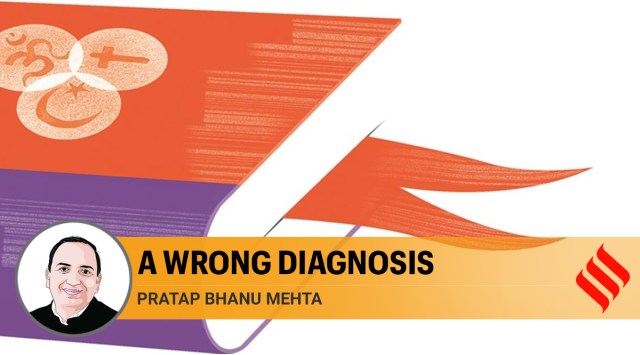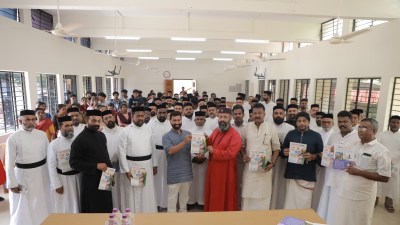- India
- International
In post-mortem of secularism, we are hand wringing over religion, missing the real crisis
PB Mehta writes: To take religion seriously is to preserve the conditions of religious freedom for all, letting each person discover the law of their own Being. I tremble at the thought of a politicised public sphere taking religion seriously.
 The lesson in the wake of Partition was that to avoid violence, you need to lower the stakes of politics by keeping religion out of it. (Representational)
The lesson in the wake of Partition was that to avoid violence, you need to lower the stakes of politics by keeping religion out of it. (Representational)Probing questions are being asked about the failures of secularism to get to the roots of India’s current crisis. One characteristically introspective piece in this vein was by Yogendra Yadav, ‘Secularism gave up language of religion. Ayodhya bhoomi pujan is a result of that’ (The Print, August 5). Yogendra and I agree about several things: The plutocracy of the old order, the reductive intellectual approaches of the Left that disabled any serious understanding of Indian culture. Secularism became synonymous with the politics of opportunism, setting up a dynamic of competitive victimisation.
But Yogendra also writes, “Secularism was defeated because it disavowed our languages, because it failed to connect with the language of traditions, because it refused to learn or speak the language of our religions. Specifically, secularism was defeated because it chose to mock Hinduism instead of developing a new interpretation of Hinduism suitable for our times.” This is a fashionable claim with surface plausibility. But, on reflection, this claim is historically problematic, philosophically dubious and culturally dangerous.
Opinion | Ram temple movement has restructured discourse, recast polity
The Indian republic was born in the shadow of the violent catastrophe of Partition. Virtually every nationalist leader outside of the Marxist Left was crafting an idiom of politics that was suffused with religious language. They were creatively trying to craft a distinct Indian modernity within an Indian vocabulary, trying to transcend tradition without making tradition despicable. But as Gandhi recognised, that project was, in one sense, a failure: It did not prevent India’s communalisation. Gandhi’s example could exercise a residual moral force. But whenever religious themes were brought into politics, whether in the quotidian policies that were enacted after Congress governments were elected in 1935, or in the larger ideological project or idiom, they generated conflict. So the idea that taking religion seriously as a political matter will solve the communal problem is a historically dubious proposition. Modern religious politics is born in the crucible of democracy and nationalism, not theology.
The lesson in the wake of Partition was that to avoid violence, you need to lower the stakes of politics by keeping religion out of it. The animating impulse of Indian secularism was to produce peace by trying not to make religion a matter of public contestation. And a lot of our compromises were a result of that. This was an impossible position to hold, because the reforms of the modern state require intervening in religion, to liberate individuals from oppressive and hierarchical religious hierarchies. Sometimes this intervention was asymmetrically applied to some groups more than others. But do these infirmities explain the legitimising of a whole-scale majoritarianism?
The current contest is hardly over traditional forms of religiosity; most Hindus have made their ideological peace with modernity and preserved religiosity. The current contest is over nationalism that has colonised both religion and secularism. Who gets to be a member of this political community, do its dominant narratives have space for its diverse histories? It is not primarily about the pieties of religion. Let us not beat around the bush over what defines the current moment. It is largely about marginalising Muslims from the Indian narrative.

PB Mehta writes: Ayodhya’s Ram temple is first real colonisation of Hinduism by political power
Let us grant, as Yogendra and I always have, the political opportunism behind secular political parties. Let us grant that some communal bigots abound in any large religious community, Hindus or Muslims. Let us grant that the Left played fast and loose with historical narratives. Does this really license what we are witnessing today: The saturation and legitimation of venomous anti-Muslim prejudice? These causes that Yogendra cites, are not causes. They are, to use Edmund Burke’s phrase, pretexts. Pretexts for prejudice across the religious-non religious binary.
To take religion seriously is to preserve the conditions of religious freedom for all, letting each person discover the law of their own Being. I tremble at the thought of a politicised public sphere taking religion seriously. It usually means someone else gets to define who you are, it usually means creating authoritative versions of religion that benchmark good or bad believers, it means sanitising religious histories of their pasts so that they become comforting narratives for people, and it means instrumentalising religion to political purposes. We do not need another version of what it means to be a good Hindu. Who can be presumptuous enough to define or benchmark that? What we need is a genuine commitment to freedom, with all its risks, self- doubts and fashioning and refashioning of identities.
There was a kind of reductive cultural crudeness in a lot of Left engagement with Indian culture. But let us get real. The Left may have the commanding heights of maybe half a dozen universities; but most universities were vernacularised in the Seventies. V D Mahajan was probably more widely read as a textbook than JNU historians. Doordarshan could rightly telecast Ramayana and Mahabharata, Delhi University’s obtuseness over including them in its syllabus notwithstanding. In short, the cultural prestige and importance of the Left in shaping Indian culture has been hugely exaggerated. They played conformist academic politics. But the idea that Hindus have been culturally marginalised is a trope that feeds into the convenient victimology of some Hindus, more than it describes a reality.
Yogendra is right that in North India there is a peculiar politics of resentment generated over the status of Hindi. But there is an implication here that secularists somehow disavowed Indian languages. This is odd because it seems to map secularism onto English. Every Indian language crafted a new vernacular version of secularism. The Hindi sphere had, for example, Ramdhari Singh Dinkar, Dharamvir Bharati, Hazari Prasad Dwivedi, Kunwar Narain and others. They constituted the sphere of religiously engaged but modernist public criticism. They were not sidelined by English but by the Hindiwallahs. The active secular, culturally nuanced Hindi public sphere was bowdlerised by the new generation of vernacular newspaper owners. The crisis is internal to Hindi and again feeds on the convenient trope the BJP uses that somehow a small cabal of metropolitan intellectuals is to blame for India’s woes.
In a post-mortem of secularism, we are hand wringing over religion, not because we lost the key there, but because there seems to be light there. The deeper question is not these ideological debates; after all, differences are inevitable and can be managed. It is the growing tolerance for prejudice and the unleashing of a ferocious darkness. Let us name the beast for what it is and not hide behind the pieties of secularism or religion. Recovering the project will not mean a return to religion, but a confidence in the promise of a new freedom struggle to salvage individual dignity and rights, not continually play out resentments against the Other.
This article first appeared in the print edition on August 11 under the title “A wrong diagnosis”. The writer is contributing editor, The Indian Express.
Opinion | Ayodhya represents a shared sentiment of sacredness
EXPRESS OPINION
More Explained
Apr 26: Latest News
- 01
- 02
- 03
- 04
- 05











































